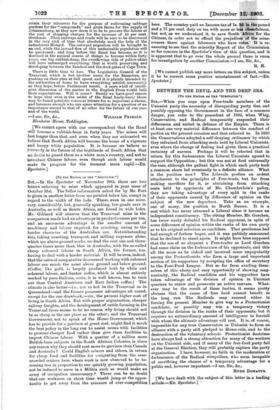BETWEEN THE DEVIL AND THE DEEP SEA.
[To TRIM EDITOR OP THIB 'SPIOTATOR..f Sra,—When you urge upon Free-trade members of the Unionist party the necessity of disregarding party ties, and possibly opposing the Government in the face of a common danger, you refer to the precedent of 1886, when Whig, Conservative, and Radical temporarily suspended their differences and united in defence of the Empire. There is at least one very material difference between the conduct of parties on the present occasion and that referred to. In 1886- the Conservatives adopted a self-denying ordinance by which they refrained from attacking seats held by Liberal Unionists, even where the change of feeling had given them a practical certainty of success. Perhaps it will be retorted that in return for this forbearance the Liberal Unionists agreed to support the Opposition ; but this was not at first universally the case, although the gallant fight in which each party took a common share led eventually to a definite alliance. What is the position now ? The Liberals profess an ardent attachment to the principles of Free-trade, but far from making sacrifices for it, or abstaining from attacking seats held by opponents of Mr. Chamberlain's policy, they are taking advantage of every split in the ranks of their opponents caused by difference of opinion on the subject of the new departure. Take as an example, one of many, the position in North Sussex. It is a seat which has never returned a Liberal since it became an independent constituency. The sitting Member, Mr. Goschen, has twice easily defeated his Radical opponent, in spite of some difference of opinion within the ranks of his own party as to his original selection as candidate. That gentleman had had enough of forlorn hopes, and it was publicly announced that he declined to stand again. It might have been supposed that the son of so eloquent a Free-trader as Lord Goschen had some claim on the forbearance of his opponents, and this all the more as he risked and incurred some unpopularity among the Protectionists who form a large and important section of his supporters by accepting the office of secretary to the Free-Food League. But so far from availing them- selves of this cheap and easy opportunity of showing mag- nanimity, the Radical candidate and his supporters have taken advantage of the division of opinion in Unionist quarters to renew and prosecute an active canvass. What- ever may be the result of these tactics, it seems pretty obvious that the cause of free food cannot benefit in the long run. The Radicals may succeed either in forcing the present Member to give way to a Protectionist candidate, or possibly may win a temporary victory through the division in the ranks of their opponents, but it requires no extraordinary amount of intelligence to foretell with whom the ultimate advantage will rest. It is, of course, impossible for any true Conservative or Unionist to form an alliance with a party still pledged to Home-rule, and to the destruction of the voluntary schools. Protectionist doctrines have always had a strong attraction for many of the workers on the Unionist side, and if many of the free-food party fail at the General Election, they will probably capture the party, organisation. I have, however, no faith in the moderation or forbearance of the Radical wirepullers, who seem incapable, of sacrificing the chance of a temporary advantage for a public end, however important.—I am, Sir, &c.,
RIME D0NATU8._
[We have dealt with the subject of this letter in a leading artiele.—ED. ,Spectator. '


























































 Previous page
Previous page